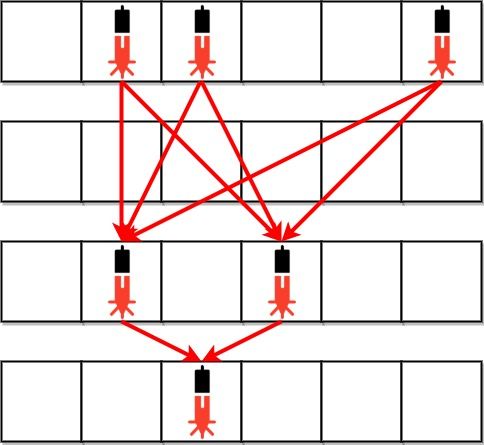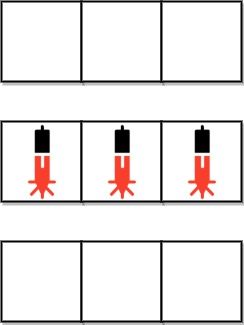Welcome to Subscribe On Youtube
2125. Number of Laser Beams in a Bank
Description
Anti-theft security devices are activated inside a bank. You are given a 0-indexed binary string array bank representing the floor plan of the bank, which is an m x n 2D matrix. bank[i] represents the ith row, consisting of '0's and '1's. '0' means the cell is empty, while'1' means the cell has a security device.
There is one laser beam between any two security devices if both conditions are met:
- The two devices are located on two different rows:
r1andr2, wherer1 < r2. - For each row
iwherer1 < i < r2, there are no security devices in theithrow.
Laser beams are independent, i.e., one beam does not interfere nor join with another.
Return the total number of laser beams in the bank.
Example 1:

Input: bank = ["011001","000000","010100","001000"] Output: 8 Explanation: Between each of the following device pairs, there is one beam. In total, there are 8 beams: * bank[0][1] -- bank[2][1] * bank[0][1] -- bank[2][3] * bank[0][2] -- bank[2][1] * bank[0][2] -- bank[2][3] * bank[0][5] -- bank[2][1] * bank[0][5] -- bank[2][3] * bank[2][1] -- bank[3][2] * bank[2][3] -- bank[3][2] Note that there is no beam between any device on the 0th row with any on the 3rd row. This is because the 2nd row contains security devices, which breaks the second condition.
Example 2:

Input: bank = ["000","111","000"] Output: 0 Explanation: There does not exist two devices located on two different rows.
Constraints:
m == bank.lengthn == bank[i].length1 <= m, n <= 500bank[i][j]is either'0'or'1'.
Solutions
-
class Solution { public int numberOfBeams(String[] bank) { int last = 0; int ans = 0; for (String b : bank) { int t = 0; for (char c : b.toCharArray()) { if (c == '1') { ++t; } } if (t > 0) { ans += last * t; last = t; } } return ans; } } -
class Solution { public: int numberOfBeams(vector<string>& bank) { int ans = 0; int last = 0; for (auto& b : bank) { int t = 0; for (char& c : b) if (c == '1') ++t; if (t) { ans += last * t; last = t; } } return ans; } }; -
class Solution: def numberOfBeams(self, bank: List[str]) -> int: last = ans = 0 for b in bank: if (t := b.count('1')) > 0: ans += last * t last = t return ans -
func numberOfBeams(bank []string) int { ans, last := 0, 0 for _, b := range bank { t := strings.Count(b, "1") if t > 0 { ans += t * last last = t } } return ans } -
function numberOfBeams(bank: string[]): number { let last = 0; let ans = 0; for (const r of bank) { let t = 0; for (const v of r) { if (v === '1') { t++; } } if (t !== 0) { ans += last * t; last = t; } } return ans; } -
impl Solution { pub fn number_of_beams(bank: Vec<String>) -> i32 { let mut last = 0; let mut ans = 0; for r in bank.iter() { let mut t = 0; for &v in r.as_bytes() { if v == b'1' { t += 1; } } if t != 0 { ans += last * t; last = t; } } ans } }